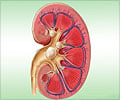A new study has revealed that a childhood kidney disorder, which scientists had believed would disappear after puberty, is likely to persist into adulthood and cause significant long-term complications.
The study's researchers suggest that better treatment options are needed for children with the disorder, called minimal change nephrotic syndrome.The minimal change nephrotic syndrome is a disorder that largely affects the blood filtering structures of the kidneys. It can be successfully treated with prednisone.
However, 10pct to 40pct of patients suffer relapses after childhood and require long-term treatment with immunosuppressive drugs.
During the study, Dr Henriette Kyreileis from Radboud University Nijmegen Medical Centre, The Netherlands and Dr Elena Levtchenko from University Hospitals Leuven, Belgium adult patients with the disease.
They performed numerous tests on the patients-including blood and urine analyses; semen analyses in men; x-ray exams; eye exams; and genetic tests.
The results showed that hypertension was found in 7 of the 15 patients, and osteoporosis was present in five of the patients.
Advertisement
In the eight male participants in the study, low sperm count was found in one patient, reduced sperm motility was detected in four patients, and defective sperm were present in six patients.
Advertisement
"Our study underscores a need for more effective and less toxic therapies for relapsing minimal change nephrotic syndrome," said the authors.
The study appears in an upcoming issue of the Clinical Journal of the American Society Nephrology (CJASN).
Source-ANI
TAN















